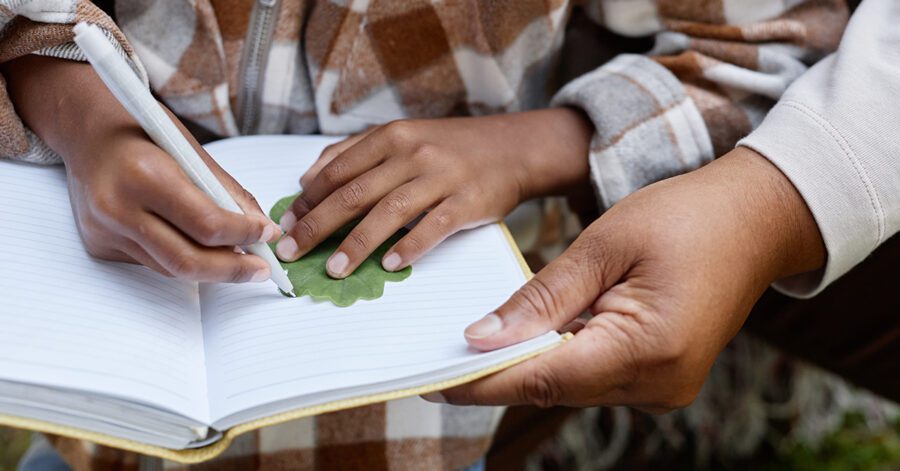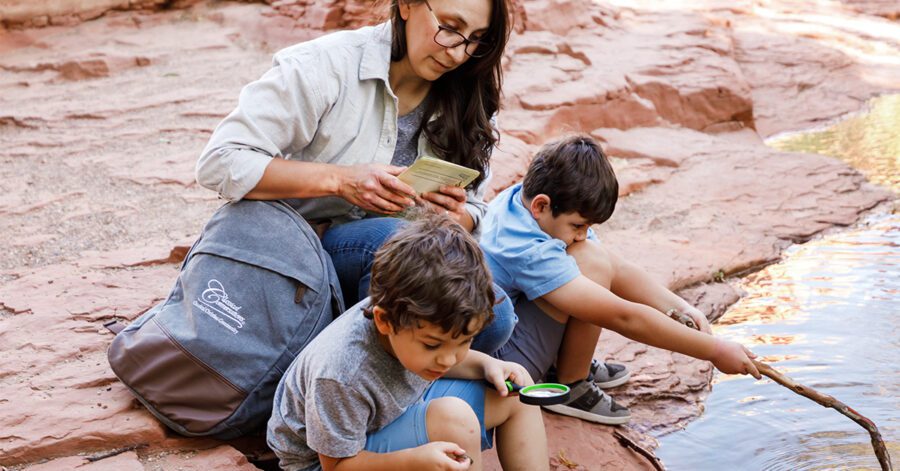My children and I have been in Classical Conversations since the fall of 2005. At that time, my three children were ages six, four, and one. Now, after all of these years, I finally have a student in Challenge A. During our first semester, we learned quite a few lessons, mostly regarding organization and study habits. I knew that this year would be a transition, so we began practicing last year when my son was eleven.
During that year, we cultivated a greater level of independence with his Essentials writing assignments. In addition, we completed a Latin program, so that he could build his Latin vocabulary and get a solid grounding in the five noun cases and the six verb tenses. We also chose to complete many of the exercises in Our Mother Tongue, by Nancy Wilson, as a final solidification of the English grammar concepts we had learned in the Essentials program.
The Perfect Game Plan—On Paper, At Least
We continued our long-standing practice of working every Saxon math problem and correcting all the incorrect answers. My son read Apologia General Science and completed the ‘On Your Own’ questions as practice for the Challenge A science. Every week, I filled out an assignment guide. I expected him to work through his assignments each day.
Armed with these good habits, we felt ready for Challenge A. However, like most young students, my son hit a few bumps along the way. We started out with a solid plan for how to organize our week. We continued the practice of filling out the week’s worth of assignments in his planner. This year, we sat down together on the evening of our Classical Conversations’ community day and planned out his week together.
This is what his assignments looked like:
Logic (Math) – Complete one Saxon lesson per day. This meant taking a test on our Classical Conversations’ community day or over the weekend, to fit in five days’ worth of work.
Grammar (Latin) – Since my son had a lot of Latin under his belt already, we did something a little different here. Days One-Two: complete assigned pages in Latin’s Not So Tough. Day Three: declensions and conjugations for new vocabulary words. Day Four: Latin readings with Mom from supplemental curriculum and review of the week’s vocabulary.
Research (Science) – Day One: outline one source for research paper. Day Two: outline second source. Day Three: fuse the outlines and write a rough draft. Day Four: type the final draft and produce the sketch.
Exposition (IEW) – Day One: create the outline. Day Two: create the rough draft. Day Three: add dress-ups and openers and have meeting with Mom, the editor. Day Four: type the final draft.
Debate (Geography) – Day One: trace the map and study the countries and capitals orally. Days Two-Four: draw the map freehand style and study countries and capitals.
Rhetoric (Apologetics) – Day One: read assigned chapter from Don’t Check Your Brains at the Door. Day Two: read assigned chapter from It Couldn’t Just Happen. Day Three: outline assigned chapter from It Couldn’t Just Happen. Day Four: study catechism questions.
This looks simple, right? So, where did we hit the bumps in the road? Early in the year, I discovered that my son would push aside the assignments he did not enjoy as well. He would bump them until late in the day when he was tired, or he would procrastinate until it was time to leave for tennis or church. Then, the temptation to push that one subject to the next day was overwhelming. Unfortunately, that meant that he started the next day behind.
Eventually, we would approach the last day before our Challenge community meetings with more than a day’s worth of work. His father and I believe in strict accountability to his tutor and to our family, so we would complete every assignment even if that meant staying up late and getting up early. On several Challenge mornings, he had to take a math test or draw a map.
Getting Control of the Schedule
After several of these weary lessons, my husband and I stepped in to help our student gain greater control of his schedule. Here are the steps we implemented:
1) He must begin each morning with the subjects he tends to put off—IEW and geography.
2) He must show me all work in his assignment guide daily before heading out the door for tennis lessons or youth group.
3) We moved all extracurricular activities from mornings to afternoons. I am not sure why this third step worked, but my son is better able to juggle his work when he has a 2 pm tennis lesson rather than going to a lesson at 9 am.
What I Wish I Had Done Differently to Prepare for Challenge A
Reading
I have a very full schedule during the school year. My children are now ages twelve, ten, seven, and two. In addition to serving as Classical Conversations’ Director of Communications, I tutor a Challenge III program. This means I must strictly manage my time throughout the school year. Because of these demands on my time, I wish I had read the Challenge A texts during the summer. If I could go back, I would read It Couldn’t Just Happen, Don’t Check Your Brains at the Door, and the Newbery literature during the summer months when our schedule is more relaxed. In this way, I would have been more thoroughly prepared to discuss and debate with my Challenge A student.
Geography
My son has never enjoyed drawing. He excels in math, Latin, and any other subject which requires a great deal of memorization. During his grammar years, I allowed him to get by with very minimal drawing assignments and instruction. His lack of practice has made drawing the maps in Challenge A difficult. He has no trouble memorizing the countries and capitals, but he does have trouble reproducing recognizable shapes. With perseverance and practice, we have come a long way this semester, but I wish I had prepared him better. With my other children, I will insist on rudimentary drawing throughout the year. They will copy simple line drawings weekly and will practice drawing the maps for that cycle so that they will have less trouble in that course.
Now that we have adjusted to the new pace of studying and the new skills, my son thoroughly enjoys his Challenge studies. He has discovered a love for science reading and research through the freedom of notebooking. He has engaged in stimulating theology debates with his classmates and has learned the basics of the five-paragraph academic essay. He has learned how to make a reasonable facsimile of maps of the United States, South America, and Europe. His familiarity with these countries and places has made our family read-alouds, as well as the evening news, more interesting. Perhaps most importantly, my son is beginning to learn how to take charge of his own education and organize a week’s worth of assignments independently. These valuable lessons will carry him through college and into a lifetime of learning.




